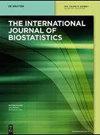MBPCA-OS: an exploratory multiblock method for variables of different measurement levels. Application to study the immune response to SARS-CoV-2 infection and vaccination
IF 1.2
4区 数学
Q4 MATHEMATICAL & COMPUTATIONAL BIOLOGY
引用次数: 0
Abstract
Studying a large number of variables measured on the same observations and organized in blocks – denoted multiblock data – is becoming standard in several domains especially in biology. To explore the relationships between all these variables – at the block- and the variable-level – several exploratory multiblock methods were proposed. However, most of them are only designed for numeric variables. In reality, some data sets contain variables of different measurement levels (i.e., numeric, nominal, ordinal). In this article, we focus on exploratory multiblock methods that handle variables at their appropriate measurement level. Multi-Block Principal Component Analysis with Optimal Scaling (MBPCA-OS) is proposed and applied to multiblock data from the CURIE-O-SA French cohort. In this study, variables are of different measurement levels and organized in four blocks. The objective is to study the immune responses according to the SARS-CoV-2 infection and vaccination statuses, the symptoms and the participant’s characteristics.MBPCA-OS:针对不同测量水平变量的探索性多块方法。应用于研究 SARS-CoV-2 感染和疫苗接种的免疫反应
研究在相同观测数据上测量的大量变量并将其组织成块(称为多块数据)已成为多个领域,尤其是生物学领域的标准方法。为了探索所有这些变量之间在块和变量层面的关系,人们提出了几种探索性多块方法。然而,这些方法大多只针对数值变量。实际上,有些数据集包含不同测量水平的变量(即数字变量、名义变量、序数变量)。在本文中,我们将重点讨论在适当的测量水平上处理变量的探索性多块方法。我们提出了具有最佳比例的多区块主成分分析法(MBPCA-OS),并将其应用于 CURIE-O-SA 法国队列的多区块数据。在这项研究中,变量具有不同的测量水平,并分为四个区块。目的是根据 SARS-CoV-2 感染和疫苗接种情况、症状和参与者的特征研究免疫反应。
本文章由计算机程序翻译,如有差异,请以英文原文为准。
求助全文
约1分钟内获得全文
求助全文
来源期刊

International Journal of Biostatistics
MATHEMATICAL & COMPUTATIONAL BIOLOGY-STATISTICS & PROBABILITY
CiteScore
2.10
自引率
8.30%
发文量
28
审稿时长
>12 weeks
期刊介绍:
The International Journal of Biostatistics (IJB) seeks to publish new biostatistical models and methods, new statistical theory, as well as original applications of statistical methods, for important practical problems arising from the biological, medical, public health, and agricultural sciences with an emphasis on semiparametric methods. Given many alternatives to publish exist within biostatistics, IJB offers a place to publish for research in biostatistics focusing on modern methods, often based on machine-learning and other data-adaptive methodologies, as well as providing a unique reading experience that compels the author to be explicit about the statistical inference problem addressed by the paper. IJB is intended that the journal cover the entire range of biostatistics, from theoretical advances to relevant and sensible translations of a practical problem into a statistical framework. Electronic publication also allows for data and software code to be appended, and opens the door for reproducible research allowing readers to easily replicate analyses described in a paper. Both original research and review articles will be warmly received, as will articles applying sound statistical methods to practical problems.
 求助内容:
求助内容: 应助结果提醒方式:
应助结果提醒方式:


